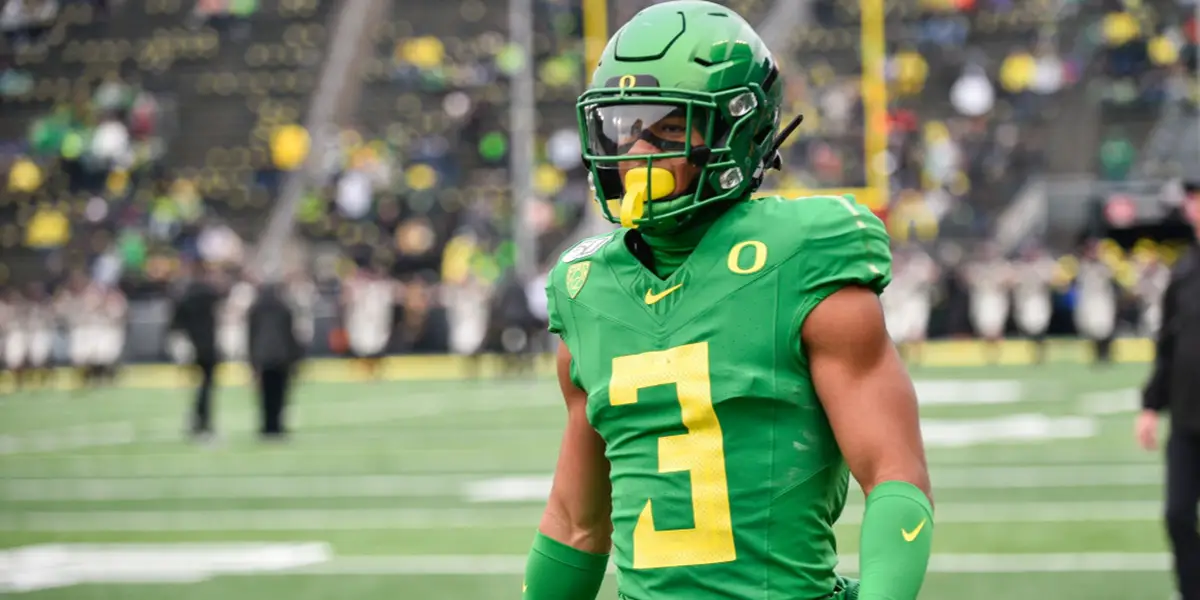If LSU’s championship run in 2019 taught college football fans anything, it’s that the game has changed. While age-old foundations such as winning the line of scrimmage and playing good defense remain important, so too is having elite, game-changing talent at the skill positions (running back, wide receiver and tight end).
The best teams have offensive playmakers across the board who cause mismatches that not even the best defensive schemes can overcome. Having a number of these players gives a team the ability to keep pace with any opponent in any situation, even when the offensive gameplan isn’t working as planned. But without top-tier skill position players, it’s extremely difficult to make it through the rigors of a college football season without a couple of hiccups along the way. At some point, a defense will expose an offense with subpar weapons by forcing them to win in one-on-one situations.
Mario Cristobal has done an admirable job of upgrading Oregon’s roster overall. The Ducks are stacked on defense, with elite talent at every level. On offense, although the Ducks are losing four stalwarts on the offensive line, they return one of the best players in the country in offensive tackle Penei Sewell. And quarterback Tyler Shough is somewhat of an unknown, but many expect him to hit the ground running, as he was one of the top quarterback recruits in the country a few years back, and he definitely impressed during his limited opportunities over the past couple of seasons.
The only legitimate liability on Oregon’s roster is its lack of difference-makers at the skill positions. The Ducks just don’t have the type of playmakers who can take over a game and carry the offense when it’s struggling, and that limits their offensive ceiling.
But all is not lost. There’s plenty of exciting talent waiting in the wings, and if just a few players break out this offseason, the Ducks will be ready to contend with the best of the best.
Why Skill Position Talent Is Necessary
It’s no longer a luxury for a title-contending program to have NFL-caliber talent at receiver, running back and tight end. It’s a necessity.
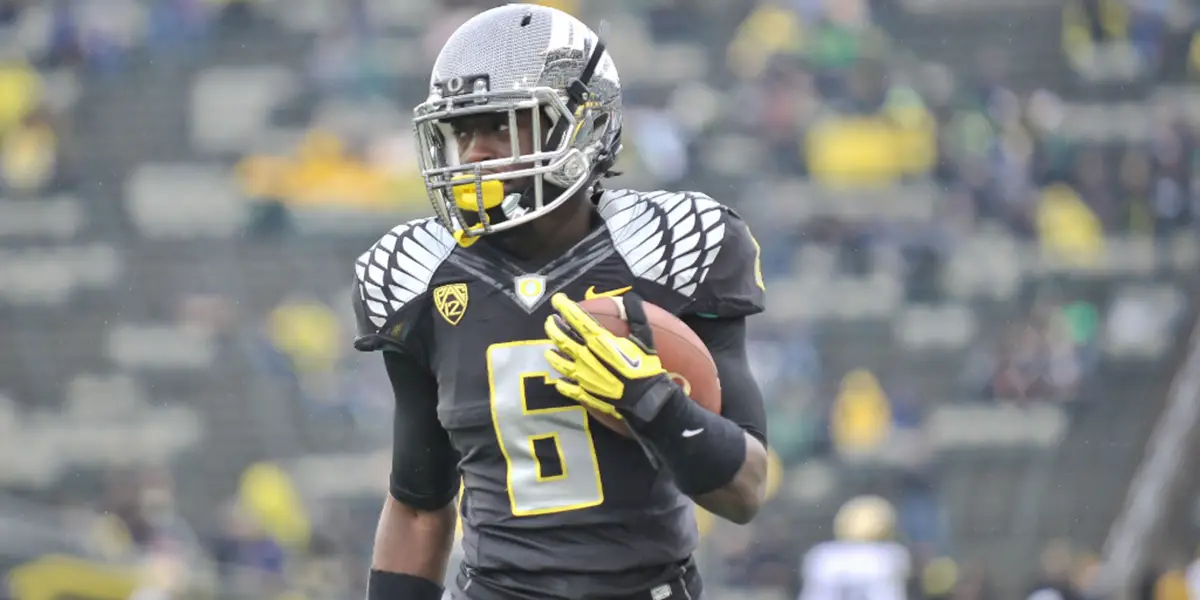
Players like De’Anthony Thomas are more valuable than ever.
Relying on a great offensive line to pave holes and grind out games is a strategy that can work at times, but not always, especially if the opposing defense loads the box and neutralizes the offensive line’s advantage. In these cases, an offense has to have a trump card; it has to have the ability to win when it can’t scheme a numbers advantage.
That’s what programs like Alabama and LSU have come to realize. Both were able to maintain a level of success behind great defenses, which allowed them to be conservative on offense and grind games out. But with offenses becoming nearly impossible to completely shut down, both the Tide and the Tigers have had to raise the bar offensively. They’ve loaded up on some of the best skill position talent in the country, and now, when their defenses struggle, or when opposing teams load the box, they can still keep up because of a deep group of talented athletes that dominate when left unaccounted for.
Even the stingiest defensive schemes can’t slow down an offense if it has enough game-changing playmakers. Clemson defensive coordinator Brent Venables threw about every blitz package that he had in his playbook at Joe Burrow and the LSU offense in the 2020 CFP National Championship, and it slowed the prolific offense for a little while. But all it took was a few downfield shots to Biletnikoff Award Winner Ja’Marr Chase (whom Clemson had to single cover due to the presence of other star LSU receivers Justin Jefferson, Terrace Marshall Jr. and tight end Thaddeus Moss) to completely render Venables’ aggressive blitzes useless.
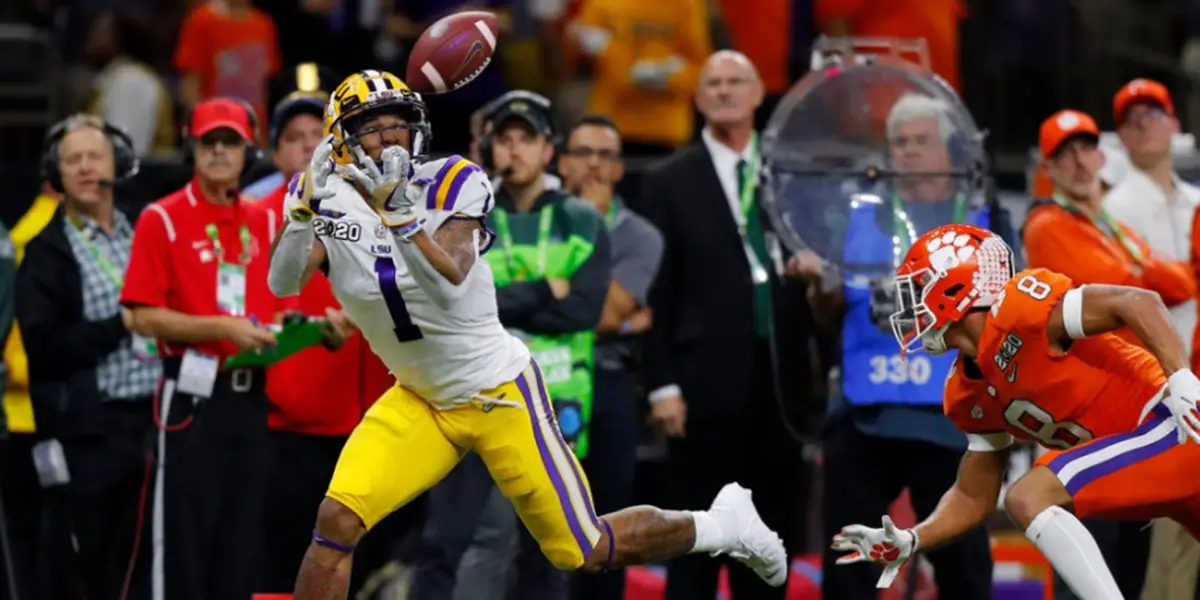
Chase torched Clemson all game long.
Former LSU passing game coordinator Joe Brady deserves a lot of credit for improving LSU’s offense in 2019, but truth be told, much of the unit’s success was a case of the Tigers’ offensive weapons being so dominant that they simply executed standard plays really well. That’s the advantage of having elite skill position talent. It gives an offense the ability to succeed regardless of the offensive scheme and regardless of how the opposing defense schemes against it, whether that’s by loading the box or double covering a star receiver. With multiple playmakers, there will always be a mismatch that an offense can take advantage of.
Where Oregon Stands
For all of Oregon’s success under Cristobal, the Ducks have struggled to field elite skill position players. And unless some new faces break out this offseason, it looks to be more of the same in 2020.
At running back, CJ Verdell and Travis Dye have carried the load for the past couple of seasons. While they’ve put up good numbers, much of that is due to running behind the best offensive line in college football. Both are capable backs, but neither has the track-level speed and explosiveness to routinely break off long runs, and neither has the tackle-breaking size and strength to grind out tough yards when the box is loaded.
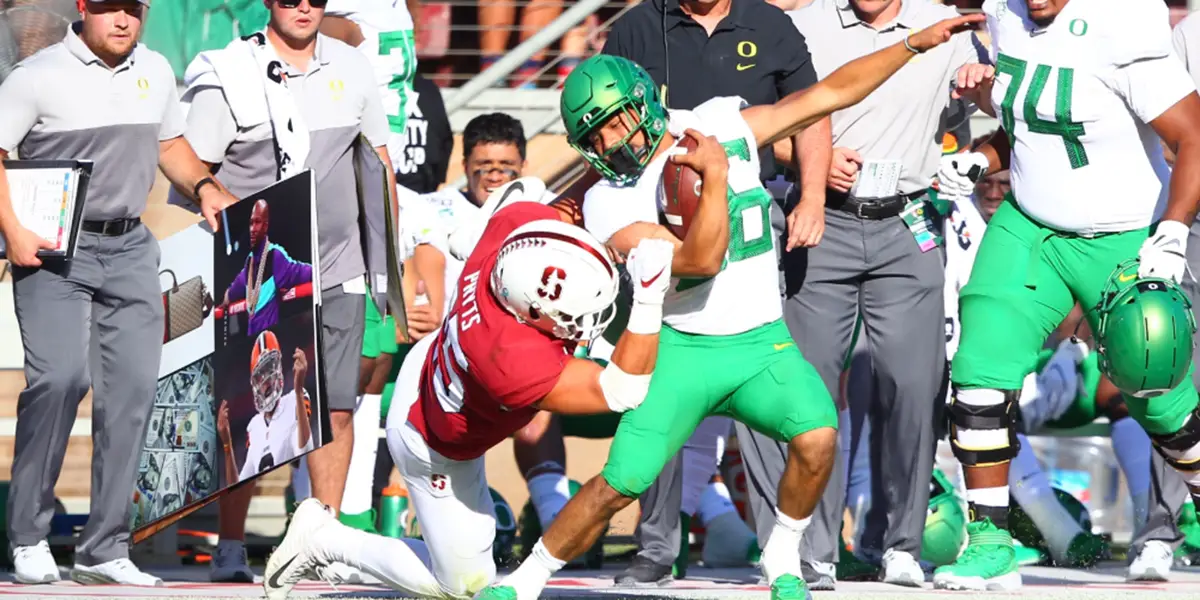
Neither Dye (above) nor Verdell have overwhelming power.
Both Verdell and Dye are good at getting up field and getting what is blocked for them, which is a valuable skill in and of itself. But they’re both at least a tier below the best running backs in the game, who each bring a skill-set to the table that allows them to stress defenses even when their offensive lines struggle.
At receiver, the Ducks’ returning starters aren’t the game-changing perimeter playmakers that are necessary in today’s game. Johnny Johnson III — a former low three-star recruit — has done an excellent job of improving his game, becoming the Ducks’ leading receiver in 2019. But even at his best, Johnson doesn’t have the talent to threaten defenses like a top-tier receiver. His size and speed combination is average, his hands remain inconsistent, and he’s merely decent getting yards after the catch. He’s a tough, determined player, but he simply doesn’t have the traits of an elite receiver.
The Ducks have plenty of former blue-chip recruits behind Johnson at receiver, but most of them have been inconsistent and have yet to earn significant playing time. And the ones that have, such as Jaylon Redd and Bryan Addison, haven’t exactly set the world on fire. On paper, the Ducks have a receiving corps with a high ceiling, but the group is more sizzle than substance at this point.
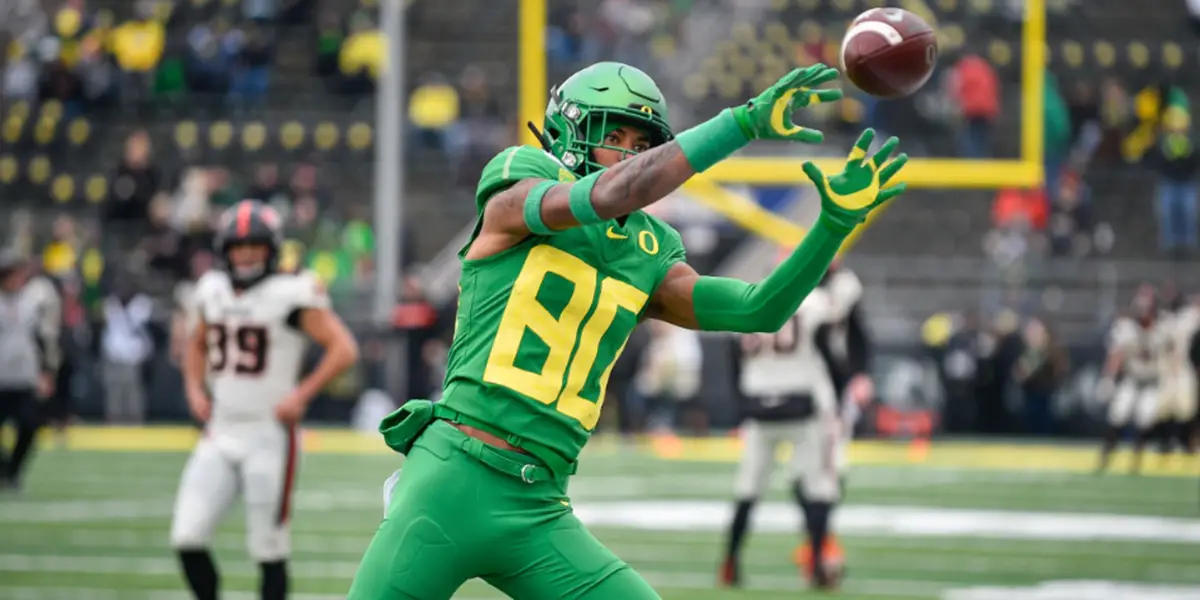
Addison showed flashes, but lacked consistency in 2019.
Finally, Jacob Breeland — the one legitimately elite skill position player the Ducks had — exhausted his eligibility, leaving behind a group of tight ends that really struggled during his absence in 2019. None of his replacements came close to replicating his success as a matchup nightmare in the passing game.
Of course, this isn’t to say that this apparent weakness won’t end up being a strength for Oregon when all is said and done. As mentioned, the Ducks have made an effort in recent years to bring in top-flight receivers, and players such as Mycah Pittman and incoming transfer Devon Williams are prime candidates to blossom into superstars. Freshman running back Trey Benson is thought by many to be the next great Oregon running back; perhaps he proves too talented to keep off the field. And tight ends Spencer Webb, Cam McCormick and Patrick Herbert are all athletic pass-catchers who certainly have the traits to pick up where Breeland left off.
Regardless if it’s by improved play from returning starters or by inserting fresh faces into the lineup, it’s paramount that the Oregon coaching staff gets more out of the skill position players in 2020. The Ducks need players on the offensive side of the ball who can single-handily take over games, especially at times during the season when the offensive gameplan just isn’t working.
It’s nearly impossible to be a championship-caliber team in modern-day football without having a deep stable of offensive weapons. If the Ducks are able to assemble an elite group of playmakers in 2020, they’ll have all of the pieces needed to make a playoff push.
Joshua Whitted
Morgantown, West ViriginiaTop Photo by Kevin Cline
Related Articles:
Why Oregon Football Always Belongs in the National Conversation
The B1G Won the 2026 Coaching Carousel...Big-Time!
Continuity? Lanning's Hiring Success is Put to the Test
Why Whether Dyer Was Down or Not...Doesn't Matter
How to Analyze Football Talent Like a Pro
Some Thoughts as the Football Withdrawals Kick In
Joshua is an adopted Duck fanatic, originally hailing from southwestern Pennsylvania. His love for the University of Oregon began as a young child when he became mesmerized by the flashy uniforms and explosive offenses of the Chip Kelly era, and now, he follows the team religiously. His fondest memory of the team is seeing De’Anthony Thomas race past Wisconsin defenders back in the 2012 Rose Bowl. A true football enthusiast, Joshua loves studying the intricacies of the game, and he aspires to become a professional sports journalist. Joshua now resides in Morgantown, West Virginia where he works in customer service. When he’s not watching Oregon replays, Joshua loves reading, writing, and spending time with his family. Contact: whittedjd@gmail.com

